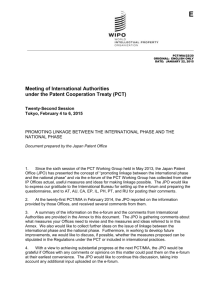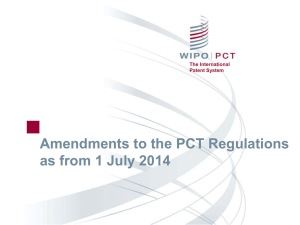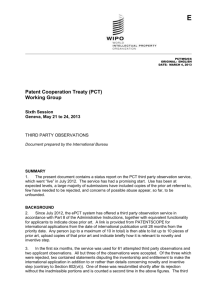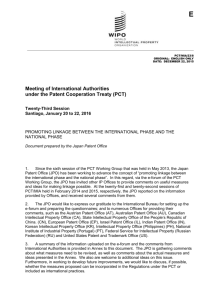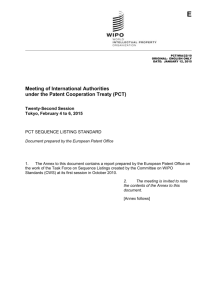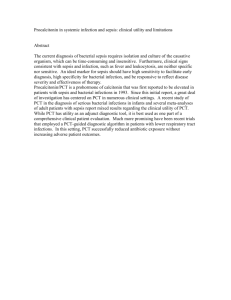PCT/MIA/21
advertisement
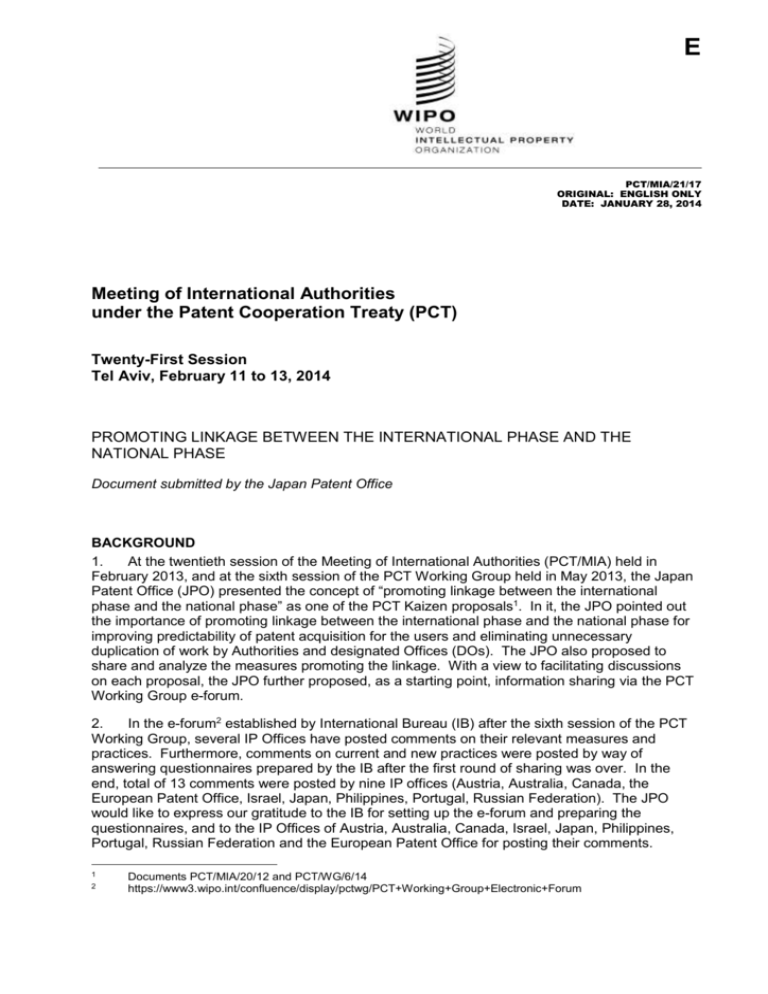
E PCT/MIA/21/17 ORIGINAL: ENGLISH ONLY DATE: JANUARY 28, 2014 Meeting of International Authorities under the Patent Cooperation Treaty (PCT) Twenty-First Session Tel Aviv, February 11 to 13, 2014 PROMOTING LINKAGE BETWEEN THE INTERNATIONAL PHASE AND THE NATIONAL PHASE Document submitted by the Japan Patent Office BACKGROUND 1. At the twentieth session of the Meeting of International Authorities (PCT/MIA) held in February 2013, and at the sixth session of the PCT Working Group held in May 2013, the Japan Patent Office (JPO) presented the concept of “promoting linkage between the international phase and the national phase” as one of the PCT Kaizen proposals1. In it, the JPO pointed out the importance of promoting linkage between the international phase and the national phase for improving predictability of patent acquisition for the users and eliminating unnecessary duplication of work by Authorities and designated Offices (DOs). The JPO also proposed to share and analyze the measures promoting the linkage. With a view to facilitating discussions on each proposal, the JPO further proposed, as a starting point, information sharing via the PCT Working Group e-forum. 2. In the e-forum2 established by International Bureau (IB) after the sixth session of the PCT Working Group, several IP Offices have posted comments on their relevant measures and practices. Furthermore, comments on current and new practices were posted by way of answering questionnaires prepared by the IB after the first round of sharing was over. In the end, total of 13 comments were posted by nine IP offices (Austria, Australia, Canada, the European Patent Office, Israel, Japan, Philippines, Portugal, Russian Federation). The JPO would like to express our gratitude to the IB for setting up the e-forum and preparing the questionnaires, and to the IP Offices of Austria, Australia, Canada, Israel, Japan, Philippines, Portugal, Russian Federation and the European Patent Office for posting their comments. 1 2 Documents PCT/MIA/20/12 and PCT/WG/6/14 https://www3.wipo.int/confluence/display/pctwg/PCT+Working+Group+Electronic+Forum PCT/MIA/21/17 page 2 3. In this meeting, the JPO will report on posted measures and proposals, and also on proposals discussed in other forums. The JPO will also make some proposals on the next steps of this project. SOME MEASURES ADOPTED OR PROPOSED 4. Presented below are some of the measures and proposals the JPO has selected from existing or proposed measures posted on the e-forum, proposals that are being discussed in other fora, and other measures by JPO. The JPO has selected these measures and proposals considered to be relatively feasible and useful. For a summary of all postings including those not presented below, please refer to the Annex hereto. I. INTERNATIONAL SEARCHING AUTHORITY MEASURES 5. In relation to taking into account of earlier search in PCT Rule 41, there is a practice as follows: in case the earlier national application and international application are both treated by the same IP office, even if the search for the earlier application has not yet been done at the time the international application is filed, examiners can carry out the search for the earlier national application first. After that, the international search report (ISR) will be established taking into account the earlier national search result. Under the above mentioned practice, searches for both the national phase and the international phase can be done simultaneously by the same examiner, making the examination procedure more efficient and reducing duplication of work at the office. Moreover, chances for applicants to get partial refund of search fee (PCT Rule 16.3) would be maximized. In view of maximizing the benefit for applicants, the JPO proposes that the practice described above should be included in the PCT Regulations. 6. When non-English patent documents are cited and relevant part of the documents are indicated in the ISRs or the like, there is a practice where the corresponding part of the patent family document in English is also indicated if there exits such a patent family document. This would enable examiner of the designated IP office who is unfamiliar with the language of the cited patent documents to understand the contents of the documents more easily. However, this would also increase work load for establishing ISRs. Therefore, the JPO thinks this practice should be limited to the case where identification of relevant part in patent family document in English is difficult for the third party. The JPO proposes this practice to be expressly stipulated in WIPO Standard ST.14. 7. Proposals were made to describe the reasoning in the written opinions of International Searching Authorities (WO/ISAs) clearly and in detailed manner, or to prepare WO/ISAs in non-English language using such expressions which can be easily translated into English. To write the reasoning in WO/ISAs in easily understandable manner is very important for national phase examiners to efficiently decide the usability of the documents cited in the international phase in light of their own national law. In order to establish such easily understandable and translatable WO/ISAs, the JPO thinks that sufficient discussion is necessary. For example, the reasoning written too much in detail could make a WO/ISA less understandable. There is no clear-cut answer for this. The JPO suggests setting up a study group including translators of the IB as members of it in order to discuss the above issue on the initiative of the IB. II. DESIGNATED/ELECTED OFFICE MEASURES 8. At the sixth session of the PCT Working Group held in last May, Brazil made a proposal according to which, designated Offices (DOs) can require applicants to submit Chapter II reports in certain cases, e.g. issues pointed out in the international phase have not been resolved for all claims3. The JPO thinks whether or not to demand the international preliminary examination (IPE) should be left to applicant’s option. Because of this, making submission of Chapter II 3 Annex II of document PCT/WG/6/23 PCT/MIA/21/17 page 3 reports mandatory would not be reasonable. From the viewpoint of promoting the applicant’s response to the negative opinion in the international phase, an alternative proposal has been discussed in other fora, which is about giving applicant a formal opportunity to comment against the negative opinion. The necessity of introducing the system which narrows applicant’s option should be carefully evaluated. 9. Instead of making Chapter II procedure mandatory, it would be beneficial to consider the way to make applicants willingly utilize Chapter II. For example, some IP offices have reduced national examination fee for applications for which they acted as the International Preliminary Examination Authority. This practice is considered to have the effect of enhancing the use of Chapter II and facilitating necessary amendments in the international phase. Moreover, some offices pointed out that the PCT-Patent Prosecution Highway (PCT-PPH) is highly effective in encouraging applicants to eliminate defects identified in the international phase prosecution. Increasing the number of participating offices for PCT-PPH or integrating PPH into the PCT system may be pursued, in order to encourage applicants to use Chapter II and amend claims as necessary in the international phase to make those claims patentable before entry into the national phase. The JPO would like to contribute towards realization of these expansions of PPH, making effort to gain understanding of those offices negative to PPH. 10. Some IP offices have stated that they assign an application to the examiner who has been involved in the international phase of the application. This is relatively easy to put into practice and the JPO thinks that this practice should be adopted by all IP offices which act both as the International Authorities and the national offices, on the assumption, of course, that the quality of the international phase product is high enough that the change of decision in the national phase does not occur. 11. There is a practice where national phase search is limited to searching the documentation of specific countries/regions or languages including domestic documents or those in the official language(s) of the IP office carrying out the national phase examination if international phase work products by another IP office are available. It is worth consideration as one possible way to avoid duplication of work between the international and national phases. However, limiting the search scope in the same way for all cases may sometimes result in inadequate search. Whether or not the search could be done appropriately under this practice should be evaluated, considering ongoing discussions among quality management experts. The JPO also suggests discussing what is an appropriate way to conduct additional searches, taking into account guidelines provided by several offices regarding how to set the scope of the additional search to be performed by the office of later examination based on the search result of the office of earlier examination. 12. In view of the situation where family information described in an ISR is not necessarily complete, a proposal was made to establish an IT system in the national phase to complement family information which became apparent after the ISR was prepared. Making the family information as complete as possible is important, as incomplete family information may discourage the IP office in the national phase from utilizing the ISR due to language barriers. The JPO would be happy if the International Bureau who collects various information from offices could cooperate to establish such an IT system. 13. PCT third party observations service started in July 2012. Practice to enable examiners of designated/elected Offices to refer to contents of documents submitted at the international phase, which would be useful information to supplement, is considered worth discussing in order to enhance linkage between the international and national phases. Moreover, some sort of feedback to the third party who submitted the observation as to whether the observation is taken into account in the national phase or not would enrich this service. PCT/MIA/21/17 page 4 III. OTHERS 14. While mutual utilization of the search and examination results between the international and national phases is the main focus of this project, many comments and proposals were made on the utilization of other IP offices’ results in general. It was pointed out that a previous search should be reviewed in conjunction with the corresponding examination report to fully understand the previous search by another IP office, and that claims that were searched by the other office should be checked to see if the claims under examination are similar enough to rely on the results of the earlier search. For example, when submitting a copy of the result of an earlier search to the receiving Office (PCT Rule 12bis.1(a)) in requesting the consideration of the search result (PCT Rule 41), it is important to submit a set of claims and examination result along with the search result. It would also be useful if such information is accessible via the WIPO’s IT system. Such an IT system would be desirable that enable offices to submit their search results along with relevant claims and examination results. NEXT STEPS 15. In principle, whether or not to implement any practice for linkage between the international phase and the national phase is up to each office’s discretion. However, for those proposals supported by all or most of IP offices, further steps forward should be taken for implementation by all IP offices with the revision of the PCT Regulations or PCT International Search and Preliminary Examination Guidelines. In that case, the proposal may be submitted to the PCT-related meetings such as the PCT Working Group as an independent proposal and creating a task force could be considered to discuss the details of the proposal. Note that opinions from stakeholders other than the International Authorities should be considered. 16. Based on the aforementioned report, the JPO would like to ask offices which practice discussed in paragraphs 5 to 14 should be discussed first toward implementation. 17. An opinion was posted stating that each IP office should be required to submit search and examination results to WIPO in order to ensure that there is a single central place to retrieve and review national proceedings. Developing an IT system to complement family information as mentioned in paragraph 12 and establishing a single central place to retrieve search and examination results of other offices as mentioned in paragraph 14 could be extremely useful to enhance mutual utilization of works in the international and national phases. Cooperation of the IB in sharing its views regarding the extent of the linkage that could be made possible using the IT system provided by WIPO and future prospects in this regard would be greatly appreciated. 18. The Meeting is invited to comment on the questions set out in the paragraph 16 and also on the proposals set out in the paragraphs 15 to 17. [Annex follows] PCT/MIA/21/17 ANNEX SUMMARIES OF COMMENTS AND PROPOSALS POSTED ON THE E-FORUM ISA MEASURES Existing practices (a-1) Regarding taking into account of earlier search (Rule 41), each IP office has unique rules: ①Even if the earlier search has not yet been done, carry out the search for the earlier examination first, before the ISR is established (JP), ②Amount of fee reimbursed (amounts fixed CA, IL, JP) or amounts varies depending on rate of usage (RU)), ③Fee will be reimbursed when: the subject-matter claimed is the same (EP), unity exists among the claims of the earlier application and the IA (JP). (a-2) In citing patent documents written in non-English language, indicate the corresponding part of the patent family documents written in English if a patent family document in English language exists (JP). (a-3) Obtain search information from the office of earlier examination (EP) or from RO other that ISA/IPEA (AU). Proposals (b-1) Prepare WO/ISA and likes using such expressions which can be easily translated into English. (b-2) Detailed and clear description of reasoning in WO/ISA (EP). (b-3) Clearly identify the scope of the search (to enable other IP offices establish search strategies) (CA). (b-4) Do not limit the international search to the subject matter considered patentable in their national law (CA, IL). (b-5) Timely establish search reports of such quality that the ISA itself will fully rely on that search when the PCT application enters the national phase before that same Office (IL). (b-6) Obtain search and classification information from other IP offices (RO) (KR). (b-7) Utilize international-type search results for a provisional application before filing of a complete PCT application (CA). NATIONAL OFFICE MEASURES Existing measures (c-1) Fee reduction in the national examination fee if Chapter II was carried out by the same office as the national phase.(AU,EPO). (c-2) Assign the same examiner throughout entire course of national and international phase examinations to the extent possible (AU, EP, IL, JP). PCT/MIA/21/17 Annex, page 2 (c-3) National phase search is limited to the documentation of specific countries/regions or languages including domestic documents or own language of the IP office carrying out the national phase examination where international phase work products by another IP office are available (RU). (c-4) Application fee is reduced where ISR has been prepared.(CA, RU). It is further reduced if the ISR was prepared by the same office as DO/EO (JP). (c-5) For all national phase applications, publish a complementary search report utilizing the International Search Report (AT). (c-6) Utilize PCT-PPH.(CA, IL). Proposals (d-1) In view of incomplete nature of the family information described in ISR, complement family information which became available after ISR was prepared in national phase (JP). (d-2) Designated office can require applicant to submit Chapter II report in certain cases, e.g. issues pointed out in international phase have not been resolved for all claims.(BR) (d-3) Make response to negative opinions presented in international phase mandatory when entering national phase. Apply sanctions against non-response (UK/US joint proposal). Mandatory only if national and international phases are conducted by the same IP office (EP etc. PCT/WG/6/24 paragraphs 95 to 101). (d-4) Develop a feedback system from designated office to ISA/IPEA on how the prior art cited in ISRs are used in the national phase and the examination results in the national phase (JP, RU). WAY OF UTILIZING WORK PRODUCTS IN INTERNATIONAL PHASE AND SEARCH RESULTS BY OTHER OFFICES Existing practices (e-1) Access not only to the previous search but also to the prior examination report and claim set (CA). (e-2) Perform top up search, expansion of classification for search subject and like (AU). (e-3) Suggest to the applicant whose earlier application filed in another country has already been granted a patent to conform the claims to the allowed claims to obtain a direct allowance (PH). An applicant is entitled by law to request that an application be allowed on the basis of a foreign patent with claims identical to those granted in the foreign country (Israel Patent Law Section 17 (c))(IL). (e-4) Provide with automatic electronic access to documents cited by other offices for the patent family application (EP). (e-5) Provide with tool for finding similar applications from the same applicant and the prior art cited in such applications (EP). (e-6) Examiners have due regard to examination results by other IP offices not just in FA phase but throughout entire examination processes to ensure that foreign examination results considered are up to date (AU). PCT/MIA/21/17 Annex, page 3 (e-7) Review applicability or relevance of decisions on search result, novelty, invention, requirement of description, and like made by other offices in light of their own laws and regulations (AU). (e-8) Check the claims that were searched by the other office to see if the claims under examination are similar enough to rely on the results of earlier searches (AU). (e-9) Review a previous search in conjunction with the corresponding examination report to fully understand the previous search (CA). WAY OF PROVIDING SEARCH AND EXAMINATION INFORMATION Existing practices (f-1) Search information containing a full history of the international search including a listing of databases consulted (including the IPC categories where relevant), the steps undertaken in the search, the specific terms keyed into the search engines, any chemical structures or gene sequences if relevant, an indication of the documents viewed, and an indication of the examiners who conducted the search (AU). (f-2) Electronically publish search strategy information (AU). Proposals (g-1) Require each IP office to submit search and examination results to WIPO for single and central place for reference (e.g. WIPO-CASE) (AU, CA, IL). (g-2) Indicate clearly the relevance of citations, novelty or inventive steps of claims, using category of documents or summary tables (AU). (g-3) Document sharing among offices, as well as sharing best practices, allows an improvement of the quality of patents (PT). [End of Annex and of document]
